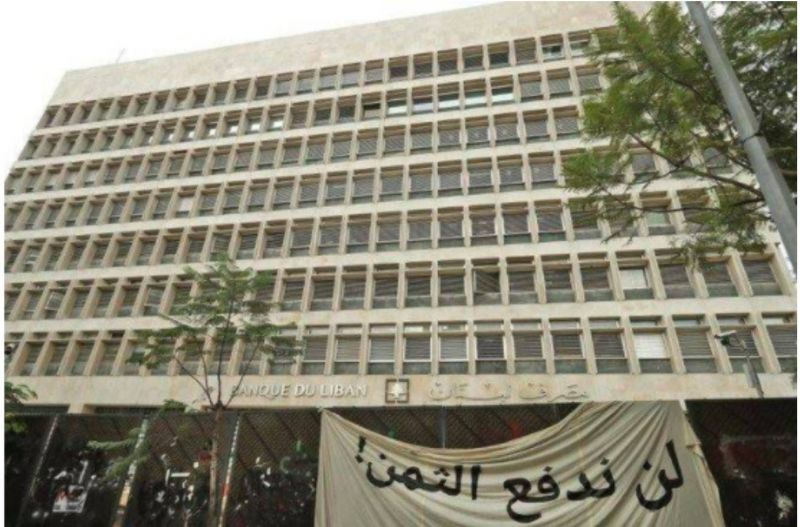
"We will not foot the bill" says a banner hung by protesters outside the central bank in Beirut in 2020. (Credit: AFP)
BEIRUT — Opposition MPs praised Monday’s long-awaited approval by the parliamentary Finance and Budget Committee of a draft law that would allow the lifting of banking secrecy from some accounts. The draft law will next be sent to Parliament, where it will be discussed and eventually voted on.
Lifting banking secrecy is a key demand of the International Monetary Fund in its preliminary agreement with the Lebanese government. The agreement states that it is important to bring the law “in line with international standards to fight corruption and remove impediments to effective banking sector restructuring and supervision, tax administration, as well as detection and investigation of financial crimes, and asset recovery.”
On Thursday, following the Finance and Budget Committee meeting, Beirut II MP Ibrahim Mneimneh from the “Forces of Change” bloc of 13 MPs close to the Oct. 17 protest movement, told L’Orient Today that though the law should be “followed up” with other reforms, “it is a positive move.”
“We are breaking a taboo of lifting banking secrecy, which is a first step, but it also should be followed up by other reforms like an independent judiciary law,” Mneimneh said.
Two other MPs from the “Change” bloc, Melhem Khalaf, also from Beirut II, and Marc Daou of Aley, also said that they were satisfied with the new draft law, describing it as an important milestone towards better accountability.
For his part MP Fouad Makhzoumi (Independent/Beirut II) told L’Orient Today on Thursday that banking secrecy should be “fully lifted,” adding, “The IMF and the international community are demanding it from us … After 9/11 all the countries in the world lifted banking secrecy, so why would you put yourself in a suspicious position, especially in the presence of armed parties?” The latter was a reference to Hezbollah, whose weapons Makhzoumi has often criticized.
He added, “BDL [Banque du Liban] is demanding that the banking secrecy law should be amended and not lifted fully, while some of the MPs who are affiliated with the banks are saying let us amend the law. For me, [I ask] why would I amend [the banking secrecy law] if the international community is asking otherwise?”
Finance and Budget Committee head Ibrahim Kanaan (FPM/Metn) stated in a press conference after the committee’s meeting that last-minute amendments suggested by the central bank and the Beirut Bar Association were not discussed, but that they will be sent alongside the approved draft law to the full Parliament, so MPs could have a chance to consider them.
He did not specify what was contained in the proposed amendments.
In its current form, the law would allow the secrecy of banking records to be lifted by the judiciary, the National Commission for the Fight against Corruption, the Special Investigation Commission, the National Deposits Guarantee Institution, and the tax authorities.
Asked last week about whether giving the authority to lift banking secrecy to the judiciary is a good thing since a law to strengthen the independence of the judiciary has not yet been approved, Kanaan told L’Orient Today that “the judiciary already has this authority, but in addition to the judiciary we have given it to the National Committee for fighting corruption, the Special Investigation Commission, the taxation authority, etc., so you have many parties that can lift banking secrecy.”
He added, “Besides we can’t just decide that there is no judiciary in Lebanon. All the sectors have their gaps. I agree that the independent judiciary law should be approved but the independence of the judiciary is also [about] an application [of the law].”
Proposed amendments to the banking secrecy law were approved by the government on April 14, and the bill was sent to the parliamentary committees for review, before final being voted on in the Finance and Budget Committee on Monday. The law will now proceed to the full Parliament.
Asked if the IMF would approve the proposed banking secrecy law in its current form, caretaker Deputy Prime Minister Saade Chami, who is a former IMF employee, said, “Yes I think they would.”
The passage of the banking secrecy proposal is just one of a list of actions demanded by the IMF.
Another is the passage of a budget. On the issue of the 2022 budget, Kanaan said the Finance and Budget Committee has been waiting since April for the government to send a study around the use of multiple exchange rates in forecasting revenues and expenses.
“How can the government use 1,500 when calculating the public sector salaries and then use [BDL’s] Sayrafa [rate, currently set at LL25,600 to the US dollar] when calculating revenues?”
On the subject of an overall financial sector rehabilitation strategy, Kanaan said that caretaker Prime Minister Najib Mikati announced in the Finance and Budget Committee meeting that took place more than two weeks ago, that the government is working on a new revised plan that includes the creation of a “recovery fund” to pay back depositors and so far, the committee has not received any such plan in writing.